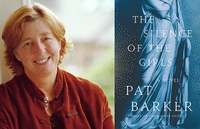DOUBLE VISION
Pat Barker, . . Farrar, Straus & Giroux, $22 (272pp) ISBN 978-0-374-20905-6
The quaint English village of Barker's 10th novel is a world away from the wars—in Bosnia, Afghanistan and elsewhere—that have scarred its main characters, but the specter of violence still looms. Kate Frobisher, a sculptor working on a monumental figure of Jesus, is recovering from a car accident and grieving for her husband, Ben, a war photographer killed in Afghanistan. Stephen Sharkey, a journalist (and friend of Ben's) suffering from post-traumatic stress syndrome after covering Bosnia, Rwanda and other conflicts, has left London and a failed marriage to write a book about "the way wars are represented." An ensemble cast gathers around these two haunted figures: Stephen's brother Robert and his family; Alec Braithewaite, the friendly vicar, and his Cambridge-bound daughter Justine; and Peter Wingrave, Kate's studio assistant and Justine's ex. A predictable mix of domestic drama (the Sharkeys' marital woes, a romance between Stephen and Justine) plays out against the backdrop of current events, but the real theme of this insightful, harrowing novel is violence: its impact on victims, but also on those who witness it and those who tell the tale. As Barker's characters are forced to acknowledge, aggression and brutality are close at hand. And Barker spares no unsettling effect—animals are turned into bloody heaps of roadkill; Kate grows paranoid about solitary Peter; Justine is the victim of a terrible beating. The effect of such unrelenting darkness is to render the story less dramatic and convincing, but this is still a gripping novel, noteworthy for the author's gifts as a stylist and her formidable, engaged intelligence.
Reviewed on: 11/10/2003
Genre: Fiction
Compact Disc - 978-1-4708-9196-1
Hardcover - 320 pages - 978-0-241-14176-2
Open Ebook - 272 pages - 978-1-4299-2320-0
Other - 1 pages - 978-1-4332-4035-5
Paperback - 272 pages - 978-0-312-42410-7


